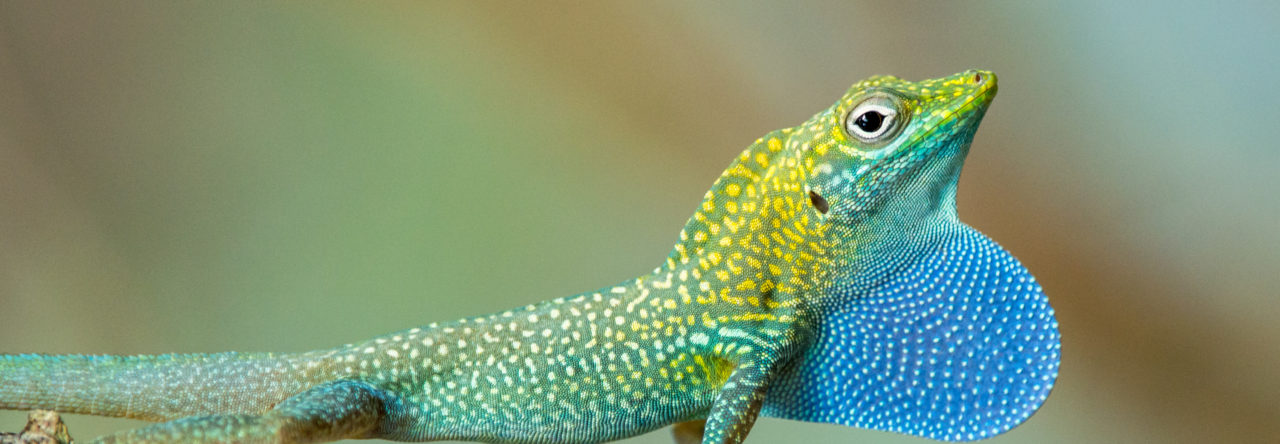Hello anolers. A friend of mine named Ryan Killackey is making a documentary film about the Yasuni region of Ecuador, home to indigenous tribes and incredible biodiversity (including anoles!). The region is also, not surprisingly, under pressure for development and the film is documenting that struggle.
A year ago, AA lamented that in Costa Rica, land full of wonderful anoles, there was scarcely an anole piece of merchandise for the anole-entranced ecotourist to purchase. More recently, we commented that not only was the same true in the Dominican Republic, another bastion of anolishness, but that tourist marts were full of merchandise sporting green iguanas, an invasive species in that country.
On my recent trip to Aruba and Curaçao in quest of A. lineatus, I took time out to survey the lizard merchandise situation. Intrepidly venturing into one souvenir shop after another, powering through crowded stalls in outdoor crafts marts, I comprehensively surveyed the supply of schlock, tchotke and junk. It wasn’t easy, but I got through it all. And the result is clear: despite their prehistoric ugliness, green iguanas are all the rage.
It has recently come to my attention that several websites (e.g. wikipedia) report that male anoles produce ultrasonic hisses while fighting. I’ve been trying to track down the source of this information, but I can’t find any reference to ultrasonic sound production in anoles in the scientific literature. Does anyone know the source of this information? Can anyone confirm that anoles are capable of producing ultrasonic sounds? I’d be grateful to anyone who can shed any light on this rumor.
Holy smokes! It turns out that Republican electoral dynamics are completely explicable by reference to…Anolis lizard community ecology! So says noted Stanford ecologist Marc Feldman. Santorum, Paul and Romney are specialized to use different niches, and Gingrich apparently is a generalist that is having trouble competing with the specialists. Given that Feldman is from Stanford, he probably had the Lesser Antilles in mind, given the work of Joan Roughgarden. But given that there are three extant “specialists,” and that the Lesser Antilles never sport more than two species, comparison to the Greater Antilles is probably more apt, which leads to the question: which ecomorph do each of the candidates represent?

 Previously, I reviewed what we currently know about anole fossils – these fossils are preserved in amber, a fossilised tree sap/resin from Mexico and the Dominican Republic (like the one pictured right). Today, I want to share how I have been using high resolution x-ray computed tomography, a.k.a CT scanning to look at these fossils and so peer into the past.
Previously, I reviewed what we currently know about anole fossils – these fossils are preserved in amber, a fossilised tree sap/resin from Mexico and the Dominican Republic (like the one pictured right). Today, I want to share how I have been using high resolution x-ray computed tomography, a.k.a CT scanning to look at these fossils and so peer into the past.
Background to CT scanning Amber
CT scanning involves x-raying an object from many angles, and then compiling these x-rays to reconstruct 3D models of the object (more detailed description here). CT scanning works when the object being scanned is made of different materials that each absorb x-rays differently. Think of a medical x-ray; skin absorbs far fewer x-rays than bone, so the two show up as different shades of grey on the developed x-ray.
The inclusions in amber are usually subfossils, where organic material still remains (e.g., bone).


Clash of the Anole Titans
From the author of “Clash of the Anole Titans” comes this poetic tale of youth redeemed, power lost, and grace under pressure. Don’t miss it.
 Anole Annals has certainly had its share of posts about anole sex (e.g., 1, 2, 3, 4). Today I’m posting another photo of anoles having sex along with a rare shot of the immediate aftermath. As you can see in the photo on the right of a pair of Anolis chlorocyanus from the Dominican Republic, the male’s hemipenis generally remains exposed for a few a seconds after mating. During this time, the male tends to walks awkwardly away from the female while raising his pelvis off the substrate to get his junk in order.
Anole Annals has certainly had its share of posts about anole sex (e.g., 1, 2, 3, 4). Today I’m posting another photo of anoles having sex along with a rare shot of the immediate aftermath. As you can see in the photo on the right of a pair of Anolis chlorocyanus from the Dominican Republic, the male’s hemipenis generally remains exposed for a few a seconds after mating. During this time, the male tends to walks awkwardly away from the female while raising his pelvis off the substrate to get his junk in order.
Don’t think I’ve ever seen one this shade of turquoise. Anyone know where it’s from?
As we all know, 2012 has been designated the Year of the Lizard. To stay up-to-date on lizardy festivities, as well as to stay abreast of issues in lizard conservation, consult http://www.parcplace.org/news-a-events/year-of-the-lizard.html. The poster can be downloaded at that site as well.
The good folks at Science magazine are giving away copies of the recent paper for free! Get yours today. Just click here.







